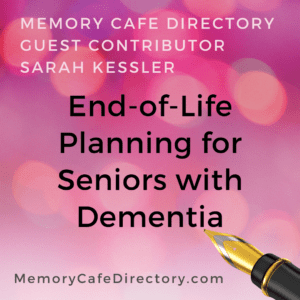Memory Cafe Directory posts and/or links to retailers can be advertising, sponsored, or affiliate links. We may earn a small commission from them. Thank you.
End-of-life planning is a critical step in protecting your family’s wellbeing. However, it’s not uncommon to put off creating end-of-life plans until we’re elderly or going into senior living. But what if the senior has dementia when it’s time to create end-of-life plans?
Creating end-of-life plans can already be difficult enough, without dementia in the mix. Caregivers and the person’s family may have to take some extra steps if they want to help a senior with dementia plan for the end of life. Below, we’ll offer some tips on doing just that.
Extra Tip For greater guidance through the process of end-of-life planning, we recommend checking out Cake’s end-of-life planning checklist.
End-of-Life Planning is Important for Dementia Patients
With so much already on their plates, dementia patients might not want to face the complex process of end-of-life planning. But it’s important to make sure they understand the importance of creating these essential documents and plans.
As soon as a senior is diagnosed with dementia, it’s best to get started preparing this documentation right away. The sooner you can help a senior with dementia create their end-of-life plans, the better.
10 Tips for Talking About EOL Planning for Seniors with Dementia
The topic of end-of-life planning can be uncomfortable for anyone. Our own death, or the death of someone close to us, is never easy to talk or think about. But with any chronic or terminal illness, the urgency to discuss end-of-life plans is increased. And that includes neurological illnesses, like dementia and Alzheimer’s.
So how can you make a patient or family member with dementia more comfortable talking about and thinking about their end-of-life plans? Here are a few ideas.
1 Normalize End-of-Life Conversations
First, you can help a person with dementia feel more comfortable with end-of-life discussions by assuring them these are a normal part of life. Every person should think about their end-of-life plans, whether they’re old or young, healthy or terminally ill.
2 Guide the Discussion with a List of Questions
Your ability to guide the conversation and ask the most important questions can help the senior with dementia feel more at ease. Consider having this list of end-of-life questions on hand when you go into the conversation.
3 Join Them in Creating End-of-Life Plans
Chances are, you could also benefit from creating or updating your own end-of-life plans. If you’re a professional caregiver, you can ask the patient’s family members to join them in preparing these essential documents and answering questions about their end-of-life plans and preferences.
4 Do it Right the First Time
If the senior is uncomfortable with the idea of end-of-life planning, the last thing you want to do is continuously bring the topic up. Set a period of time for the two of you, or the family, to talk about end-of-life planning. Make sure that you cover all of the essential topics quickly and efficiently.
5 Let Them Talk About Their Life
On the other hand, if the senior is comfortable and wants to discuss their life and their end-of-life plans, it’s important to let them do so. Reminiscing about their life can help the senior decide what they’d like the end of their life to look like.
6 Record Your Conversations or Take Detailed Notes
Ask the senior if they would mind you recording your conversations on your phone. This can help you make sure that you honor their wishes when the time comes if there’s something that doesn’t make it into an official document. If they’re not comfortable with that idea, let them know that you’ll be taking detailed notes to make sure you get everything recorded correctly.
7 Have Key End-of-Life Documents Ready
Before you start the discussion with a senior who has dementia, you can get everything in order and ready to go. That means bringing together important documents like life insurance and health insurance policies, and making a list of the senior’s assets, in addition to the list of questions linked above.
8 Meet With Their Healthcare Team
If you’re a family member or a private caregiver, it’s important to meet with the senior’s primary care doctor. Their medical team will help the senior create an advance directive and designate a healthcare proxy. They’ll keep these documents on file in case they’re needed if the senior enters the hospital.
9 Help Them Create a Will Online
Many people believe that you have to work with an attorney to create a last will and testament. However, that’s not necessarily the case. If the senior has a large or complicated estate, working with a lawyer may be the best option. But if they don’t, you can help the senior create a will online. After that, you’ll need to help them make the will legal, which typically involves signing the printed will in front of two non-beneficiary parties.
10 Be Patient
At the end of the day, a senior may not be ready to discuss their end-of-life plans, and it’s important not to push too hard. Seniors with dementia can become overwhelmed easily, and if they become overwhelmed with the idea of end-of-life planning, they might not want to discuss it later on.
Prepare These End-of-Life Planning Documents
As mentioned, it’s a good idea to prepare as much as you can before discussing end-of-life plans with a senior who has dementia. It’s important that you understand which documents need to be prepared and kept on file when you’re assisting someone who has dementia. Here are the key documents that the senior will need to prepare or keep on hand:
- Power of attorney
- Will and testament
- Life insurance and health insurance policies
- Advance directive or living will
- Healthcare proxy
Dementia and End-of-Life Planning
Dementia can make many things in life more difficult than they would be otherwise. And important tasks, like end-of-life planning can be especially hard.
With your help, though, your patient or family member with dementia can have the peace of mind that their affairs are in order. They’ll know that they’ve protected their family’s financial wellbeing, as well as made their own wishes known.
About the Author

Sarah Kessler
Sarah Kessler
Sarah Kessler is a writer at JoinCake.com, an end-of-life planning website with free resources and information on how to estate plan and honor loved ones’ final wishes.
Become a Contributor!
 Do you want to be a Memory Cafe Directory contributor? If you have helpful information to share with our community, read about the guidelines, then get in touch to discuss what you have to offer.
Do you want to be a Memory Cafe Directory contributor? If you have helpful information to share with our community, read about the guidelines, then get in touch to discuss what you have to offer.
Thank you.




